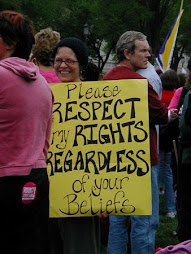Dr. Henry Morgentaler died today. I don't write in this blog much at all anymore. I'm working on another project and had to set this aside. But the loss of this great man requires a few words. I need to take a moment to pay my respects.
Because of Dr. Morgentaler, I am a free woman. I have the right to decide what happens to my own body and I have the right to live and act according to my own conscience. Without this right, I would not be free. Dr. Morgentaler understood this. He believed in freedom. He believed in women. He trusted women. He trusted me.
I feel so much gratitude to this man. He bore the burden of the abortion rights movement in a way no one else did, and, I suspect, in a way no one else could. The strength it must have taken is unimaginable. In my very small role in the movement, I sometimes get tired - tired of the scorn and the name calling, the threat of violence. But if Dr. Morgentaler got tired, he never showed it, at least not in public. He went to jail to make the point that women can and must make their own decisions about their reproductive lives, their bodies and their families and their pregnancies. He was a true feminist. He lived his ideals. Even when it cost him. He fought and suffered for my rights before I even knew I needed him to, before I realized I wasn't equal, before I understood I didn't have the same rights as a man, before I felt in my heart the truth that we are all entitled to human rights by virtue of being human, and that there can be absolutely no qualifiers on that, no hedging, no conditions. Through his work and his commitment to the cause and his repeated demonstrations of courage, he enlightened me. He showed me that human rights are unconditional. Even for women.
I will always be grateful.
Danielle Smith’s Fundraising Machine
6 days ago



